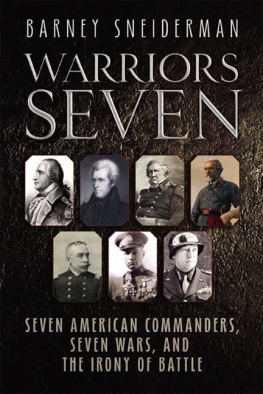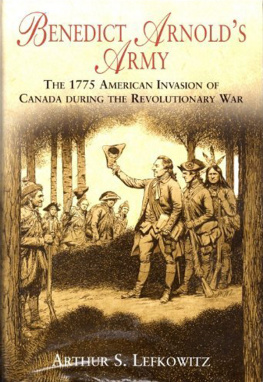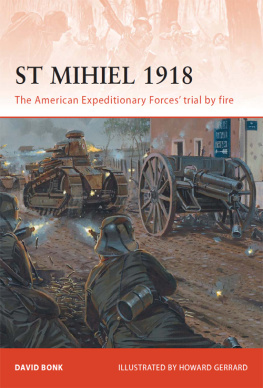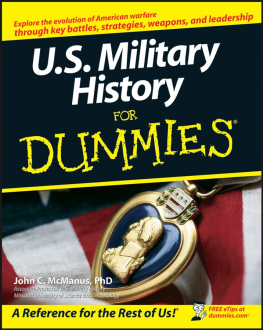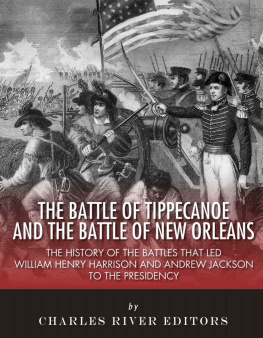Barney Sneiderman - Warriors Seven: Seven American Commanders, Seven Wars, and the Irony of Battle
Here you can read online Barney Sneiderman - Warriors Seven: Seven American Commanders, Seven Wars, and the Irony of Battle full text of the book (entire story) in english for free. Download pdf and epub, get meaning, cover and reviews about this ebook. year: 2006, publisher: Savas Beatie, genre: History. Description of the work, (preface) as well as reviews are available. Best literature library LitArk.com created for fans of good reading and offers a wide selection of genres:
Romance novel
Science fiction
Adventure
Detective
Science
History
Home and family
Prose
Art
Politics
Computer
Non-fiction
Religion
Business
Children
Humor
Choose a favorite category and find really read worthwhile books. Enjoy immersion in the world of imagination, feel the emotions of the characters or learn something new for yourself, make an fascinating discovery.
- Book:Warriors Seven: Seven American Commanders, Seven Wars, and the Irony of Battle
- Author:
- Publisher:Savas Beatie
- Genre:
- Year:2006
- Rating:5 / 5
- Favourites:Add to favourites
- Your mark:
Warriors Seven: Seven American Commanders, Seven Wars, and the Irony of Battle: summary, description and annotation
We offer to read an annotation, description, summary or preface (depends on what the author of the book "Warriors Seven: Seven American Commanders, Seven Wars, and the Irony of Battle" wrote himself). If you haven't found the necessary information about the book — write in the comments, we will try to find it.
The subjects of this study include: Benedict Arnold, Andrew Jackson, Winfield Scott, Robert E. Lee, George Dewey, Billy Mitchell, and George Patton. These courageous leaders are successively featured in each of Americas seven wars from 1775 to 1945: the Revolutionary War, the War of 1812, the Mexican War, the Civil War, the Spanish-American War, World War I, and World War II. Each entry highlights or focuses upon a single battle: Saratoga (1777), New Orleans (1815), Mexico City (1847), Malvern Hill (1862), Manila Bay (1898), St. Mihiel (1918), and Messina (1943).
Each entry highlights the life and military career of each commander up to the moment of the featured battle, with a thread of continuity coursing through each chapter. For example, the essay on Andrew Jackson opens with a battle fought during the Revolutionary War that Jackson witnessed as a 13-year-old courier for the Continental Army.
Twenty-seven original battlefield maps facilitate the readers understanding of the momentous events described in these pages. Warriors Seven will be welcomed by anyone who appreciates gripping narrative military history leavened with a slice of historical irony.
Barney Sneiderman served as a professor in the Faculty Law, University of Manitoba, in Winnipeg, Canada, from 1969 until illness prompted his retirement in 2006. He is the principal author of the acclaimed Canadian Medical Law: An Introduction for Physicians, Nurses, and other Health Care Professionals (3rd Edition, 2003, Carswell). The Connecticut native and former journalist is known for his lively and user-friendly writing style. Warriors Seven is a reflection of his longtime interest in American and European political and military history. He lives in Manitoba with his wife and children.
PRAISE Dr. Sneiderman has written a brilliant and fascinating book. . . . that shows how genius, resolve, dedication, opportunity, and hard work create great military leaders, but also how demons sometimes lurk in the hearts of famous men and dull their glory. Noted historian Bevin Alexander
Barney Sneiderman: author's other books
Who wrote Warriors Seven: Seven American Commanders, Seven Wars, and the Irony of Battle? Find out the surname, the name of the author of the book and a list of all author's works by series.

